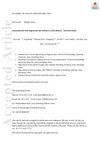 March 2023 in “JAAD case reports”
March 2023 in “JAAD case reports” A new genetic change in the keratin 10 gene caused a skin condition called ichthyosis hystrix in a father and his daughter.
466 citations,
June 2009 in “Experimental dermatology” We now understand more about what causes acne and this could lead to better, more personalized treatments.
[object Object] 2 citations,
June 2024 in “Journal of Clinical Medicine” Alopecia Areata can affect nails, often improving on its own, but JAK inhibitors may help.
August 2021 in “Indian dermatology online journal” A young boy with a rare skin and nail condition improved significantly with simple topical treatments.
 1 citations,
January 2012 in “Elsevier eBooks”
1 citations,
January 2012 in “Elsevier eBooks” The document concludes that the skin is a complex organ providing protection, sensation, and healing, with challenges in treating conditions like itchiness.
 April 2024 in “Histochemistry and cell biology”
April 2024 in “Histochemistry and cell biology” N-acetylcysteine may prevent hair loss caused by chemotherapy.
 22 citations,
June 1980 in “International Journal of Dermatology”
22 citations,
June 1980 in “International Journal of Dermatology” The document concludes that correct diagnosis of alopecia types is crucial, scalp biopsies are important, and more research is needed.
 23 citations,
January 2008 in “Clinics in dermatology”
23 citations,
January 2008 in “Clinics in dermatology” Diet changes can help reduce acne by limiting certain hormones.
[object Object]  5 citations,
January 2022 in “Scientific reports”
5 citations,
January 2022 in “Scientific reports” The research identified two types of keratinocytes in chicken scales: one for hard scales and another for soft skin, with similarities to human skin differentiation.
 5 citations,
July 2018 in “Experimental Dermatology”
5 citations,
July 2018 in “Experimental Dermatology” The "Punch Assay" can regenerate hair follicles efficiently in mice and has potential for human hair regeneration.
 December 1991 in “Annals of the New York Academy of Sciences”
December 1991 in “Annals of the New York Academy of Sciences” Keratin proteins are crucial for hair structure and strength.
 26 citations,
January 2007 in “Organogenesis”
26 citations,
January 2007 in “Organogenesis” Bioengineering can potentially treat hair loss by regenerating hair follicles and cloning hair, but the process is complex and needs more research.
 2 citations,
January 2017 in “PubMed”
2 citations,
January 2017 in “PubMed” Hair casts are harmless but can be mistaken for head lice.










